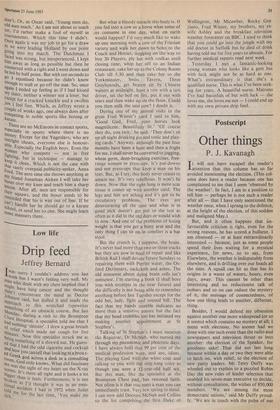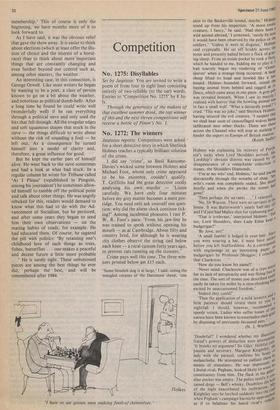Postscript
Other things
P. J. Kavanagh
It will not have escaped the reader's attention that this column has so far avoided mentioning the election. (This col- umn does have a reader because one has complained to me that I seem 'obsessed by the weather'. In fact, I am in a position to tell him — perhaps he is not such a reader after all — that I have only mentioned the weather once, when I sprang to the defence, at the height of the election, of this sodden and maligned May.) But, and it often happens that Un- favourable criticism is right, even for the wrong reasons, he has scored a bullseye. I am obsessed — or at least extraordinarily interested — because, just as some people spend their lives waiting for a mystical experience, for news, so to say, from Elsewhere, the weather is indisputably from elsewhere, and is drifting over our heads all the time. A squall can hit us that has its origins in a waste of waters, hours, even days, away. This cannot be other than interesting and no reductionist talk of isobars and so on can reduce the mystery of it, the message of connectedness, of how one thing leads to another, different, thing.
Besides, I would defend my obsession against another one more widespread (or so it seems) which contains no mystery at all; I mean with elections. No sooner had we done with one such event than the radio and newspapers and television thrust us into another: the election of the Speaker, for goodness sake! That did not last long because within a day or two they were able to latch on, with relief, to the election of new party leaders. Mr Terry Duffy was wheeled out to explain to a puzzled Robin Day the new rules of leader selection that enabled his seven-man executive to decide, without consultation, the wishes of 850,000 members. 'We are among the most democratic unions,' said Mr Duffy proud- ly. 'We are in touch with the pulse of our
membership.' This of course is only the beginning, we have months more of it to look forward to.
As I have said, it was the obvious relief that gave the show away. It is easier to think about elections (which at least offer the illu- sion of choice and the interest of a horse- race) than to think about more important things that are constantly changing and even further beyond our control such as, among other matters, the weather.
An interesting case, in this connection, is George Orwell. Like most writers he began by wanting to be a poet, a class of person known to go on a bit about the weather, and notorious as political dumb-bells. After a long time he found he could write well (wonderfully well) if he ran everything through a political sieve and only used the bits that fell through. All the irregular edges and soft squamous shapes that stuck in the sieve — the things difficult to write about without the risk of sounding a fool — he left out. As a consequence he turned himself into a model of clarity and, therefore, a great influence for good.
But he kept the earlier part of himself alive. He went back to the sieve sometimes and had a look at what had stuck. In a regular column he wrote for Tribune called 'As I Please' (republished in Penguin, among his journalism') he sometimes allow- ed himself to ramble off the political point and talk about other things. He was angrily rebuked for this, readers would demand to know what this had to do with the Ad- vancement of Socialism, but he persisted, and after some years they began to send him their own observations — on the mating habits of toads, for example. He had educated them. Of course, he sugared the pill with politics: 'By retaining one's childhood love of such things as trees, fishes, butterflies .. . one makes a peaceful and decent future a little more probable
' He is surely right. These unbuttoned pieces are among the best things he ever did, perhaps the best, and will be remembered after 1984.



















































 Previous page
Previous page